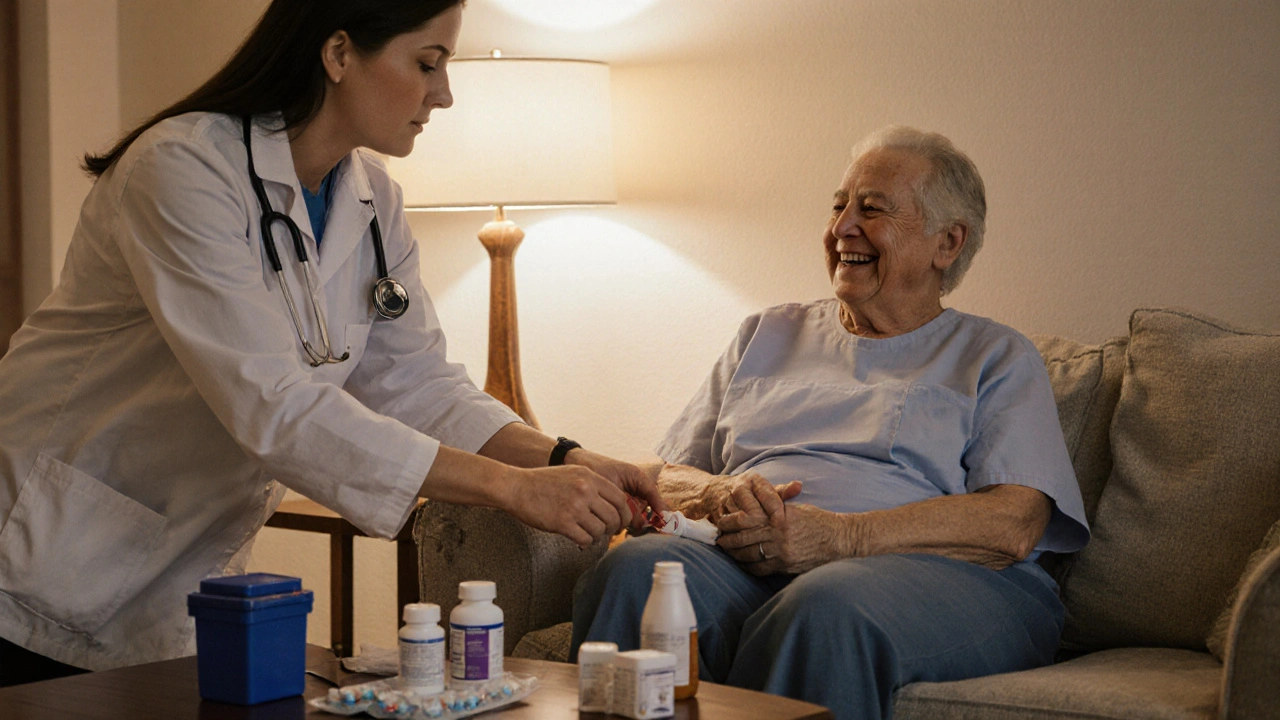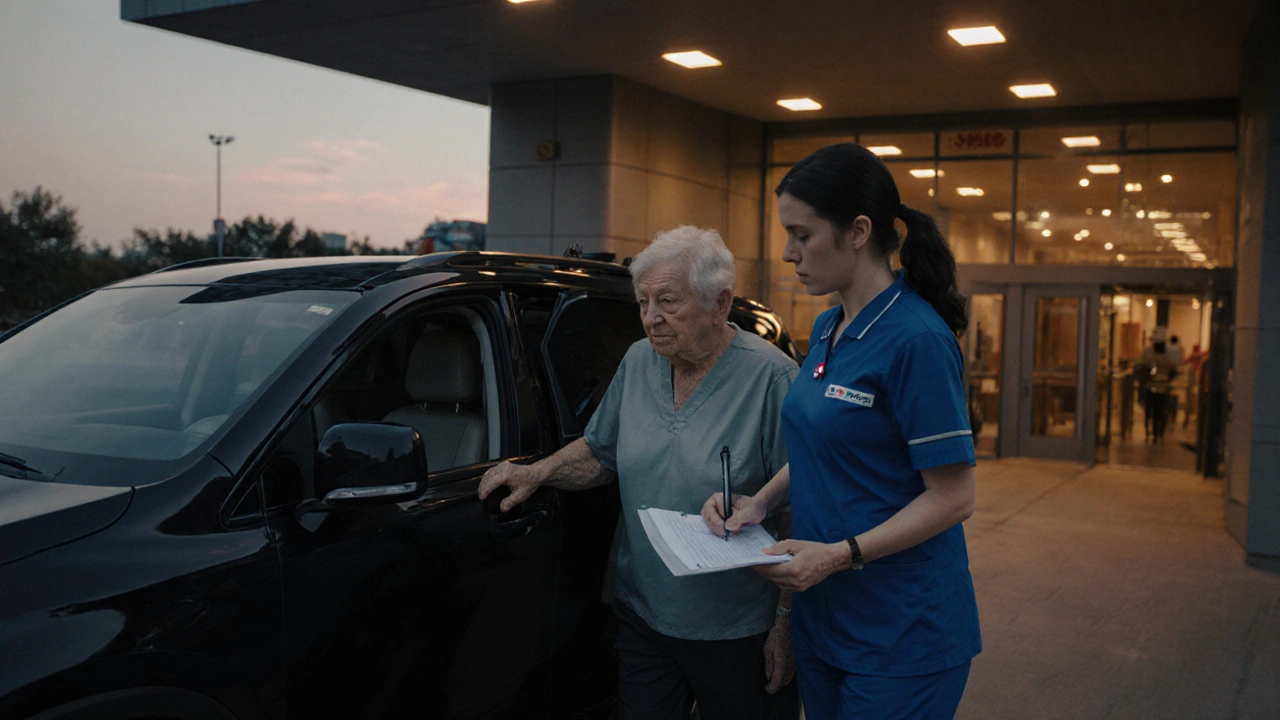Going in for same-day surgery shouldn’t mean being left alone afterward. Whether it’s a knee arthroscopy, cataract removal, or a minor hernia repair, outpatient procedures are designed to get you home the same day. But what happens when you can’t drive, feel dizzy from anesthesia, or just need someone to help you get up the stairs? That’s where medical escort services step in.
What Exactly Is a Medical Escort Service?
A medical escort service isn’t just a ride home. It’s a trained professional who accompanies you before, during, and after your outpatient procedure. These aren’t taxi drivers or family members-they’re certified personnel with basic medical training. They know how to handle post-anesthesia confusion, monitor for dizziness or nausea, and help you safely transition from hospital to home.In Australia, these services are often provided by private companies contracted by hospitals or chosen directly by patients. They’re common in Perth, Melbourne, and Sydney, where aging populations and rising outpatient surgery rates have made demand grow. Unlike ambulance services, medical escorts don’t transport emergencies. They handle planned, non-urgent care-exactly the kind that leaves patients vulnerable after anesthesia wears off.
Why You Can’t Just Rely on a Friend or Uber
You might think, “I’ll just ask my sister to pick me up.” Or, “I’ll book an Uber.” But here’s the problem: most ride-share drivers aren’t trained to handle medical needs. If you vomit in the car, they can’t help you. If you pass out on the way home, they don’t know how to respond. And if you’re confused and can’t give your address? That’s when things go wrong.Family members often mean well, but they’re not prepared. They might be stressed, tired, or unfamiliar with your condition. One patient in Perth told her story after her son drove her home from a cataract surgery. She couldn’t remember her own address. He had to call the hospital twice to confirm. She ended up sitting in the car for 40 minutes while he figured it out.
Medical escorts carry a checklist: confirmed pickup time, patient’s name, procedure details, emergency contacts, and home address. They know what to watch for-slurred speech, uneven pupils, difficulty breathing. They don’t replace nurses, but they bridge the gap between hospital discharge and safe home recovery.
How These Services Work: A Real Example
Here’s how it usually plays out:- You book the service through your surgeon’s office or directly with a provider. Most require 24-48 hours’ notice.
- On the day of surgery, the escort arrives at the clinic or hospital 30 minutes before your discharge.
- They confirm your identity, check your discharge paperwork, and verify your home address.
- They walk you to the vehicle, help you sit down, and secure your seatbelt.
- During the ride, they monitor your condition. If you feel sick, they have motion-sickness bags and water. If you’re disoriented, they calmly guide you.
- At home, they help you get inside, sit down, turn on the TV or lights, and make sure you have your medications.
- They stay for 10-15 minutes to confirm you’re settled and have someone to call if needed.
- They leave a printed checklist with your name, procedure, and emergency numbers.
This isn’t luxury-it’s safety. One study from the Royal Australasian College of Surgeons found that patients using medical escorts had 68% fewer unplanned readmissions within 72 hours compared to those who went home alone.

Who Benefits Most From These Services?
Not everyone needs one. But these groups benefit the most:- People over 65, especially those living alone
- Patients with mobility issues, even mild ones
- Those taking blood thinners or with low blood pressure
- Anyone who’s had sedation or general anesthesia
- Patients without reliable transportation or supportive family nearby
- People with cognitive conditions like early dementia or anxiety disorders
It’s not about being frail. It’s about minimizing risk. Even healthy people can have delayed reactions to anesthesia. One 58-year-old man in Fremantle had a colonoscopy. He felt fine walking out-until he tried to stand up in his driveway 20 minutes later. He fell, cracked his hip, and spent a week in hospital. His escort had been canceled because he thought he’d be “fine.”
Cost and How to Get It Covered
In Australia, medical escort services typically cost between $80 and $150, depending on location and distance. In Perth, the average is around $110 for a standard trip under 20km.Some private health insurers cover part or all of the cost under ancillary or “extras” cover. Check your policy for “transport assistance” or “post-operative support.” Medicare doesn’t pay for it-it’s not considered a medical procedure. But some hospitals offer subsidies if you’re on a low income or have a concession card.
Many surgical centers now partner with escort providers. Ask your surgeon’s office: “Do you have a recommended medical escort service?” If they say no, ask for a list of local providers. You can also search for “medical transport Perth” or “outpatient escort services Australia.”
Red Flags to Watch For
Not all services are created equal. Here’s what to avoid:- Providers who don’t have trained staff (just drivers with no medical knowledge)
- No written confirmation or checklist provided
- Unclear pricing-no quote given upfront
- No background checks on staff
- They won’t confirm your procedure details or emergency contacts
Always ask: “Is your staff certified in basic first aid or patient handling?” Reputable providers train their escorts in CPR, fall prevention, and post-op monitoring. Some even have nurses on call during transport.

What to Do If You’re Alone and Can’t Afford It
If money’s tight and you have no one to help you, don’t skip your surgery. Talk to your surgeon’s office. Many hospitals have social workers who can connect you with community programs. In Western Australia, organizations like St John Ambulance and Volunteer Transport Network offer low-cost or free transport for medical appointments, including post-op care.Some local councils also run transport programs for seniors. Call your local council’s aged care line. You’d be surprised how many options exist if you ask.
What Happens If Something Goes Wrong During the Ride?
All reputable medical escort services carry emergency protocols. If you have a drop in blood pressure, start vomiting, or lose consciousness, they’re trained to:- Call emergency services immediately
- Stay with you until help arrives
- Provide your medical history and discharge summary to paramedics
- Notify your surgeon or emergency contact
They’re not EMTs, but they’re trained to act quickly. One escort in Joondalup once helped a patient who had a seizure right after leaving the hospital. She kept the patient safe, called 000, and stayed with them until the ambulance arrived. The patient later thanked her-she’d been alone and scared.
Final Thought: It’s Not a Luxury. It’s a Safety Net.
Same-day surgery sounds convenient. But convenience shouldn’t come at the cost of safety. You wouldn’t let someone drive your car without a license. Why let someone drive you home after surgery without training?Medical escort services are quiet, unglamorous, and often overlooked. But they’re one of the most effective ways to prevent complications after outpatient procedures. They don’t cost much. They don’t take long. But they can mean the difference between a smooth recovery and a hospital readmission.
If you’re scheduled for surgery this week, don’t wait until the last minute. Book your escort when you book your surgery. It’s one of the smartest decisions you’ll make.
Are medical escort services covered by Medicare in Australia?
No, Medicare does not cover medical escort services. These are considered non-medical transport and fall under private or out-of-pocket expenses. However, some private health insurers include them under ancillary or extras cover. Always check your policy for terms like "transport assistance" or "post-operative support."
Can I book a medical escort on the same day as my surgery?
It’s possible in emergencies, but not recommended. Most reputable providers require at least 24 to 48 hours’ notice to ensure trained staff are available and to confirm your details with the hospital. Same-day bookings may cost more or be declined if staffing is full.
Do medical escorts help with medication or wound care at home?
No. Medical escorts are not nurses and do not administer medication, change dressings, or provide clinical care. Their role is strictly to ensure safe transport and basic post-op support-like helping you sit down, turning on lights, or making sure you have your meds. For clinical care, you’ll need a home nurse or carer.
How do I find a reliable medical escort service in Perth?
Start by asking your surgeon’s office-they often have partnerships with local providers. You can also search online for "medical transport Perth" or check with St John Ambulance, the Volunteer Transport Network, or your local council’s aged care services. Always ask if staff are trained in first aid and if they provide a written checklist.
Is it worth paying for a medical escort if I live close to the hospital?
Yes. Distance doesn’t matter-risk does. Even a 5-minute drive can be dangerous after anesthesia. You might feel fine walking out, but dizziness, nausea, or low blood pressure can hit 20 minutes later. A trained escort can spot early signs and respond before things escalate.
